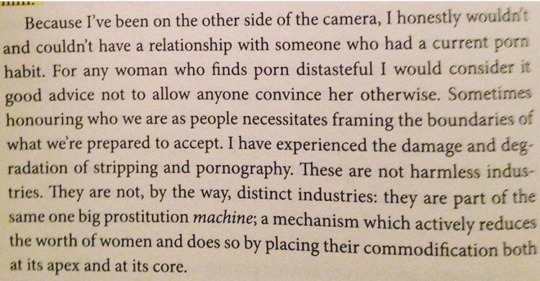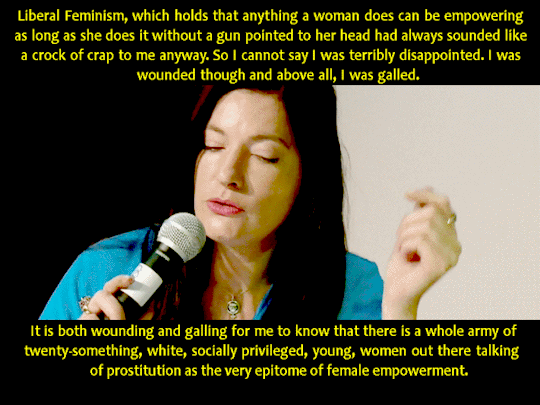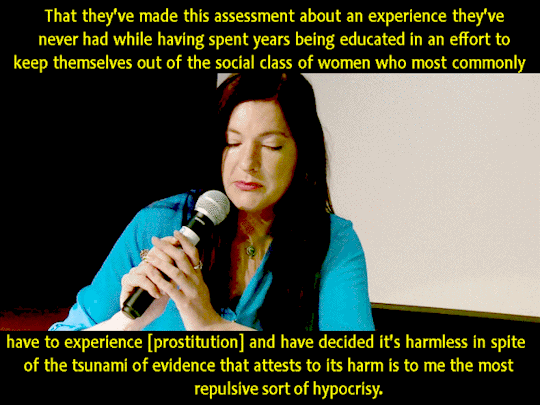Photo

Rachel Moran writes about her experience of prostitution and pornography in her book ‘Paid For; My Journey Through Prostitution’
2K notes
·
View notes
Quote
Making women seem anti-sex and joyless if we want the right to be sexual without being humiliated or hurt, and making men seem wimpy and undersexed if they prefer cooperation to domination, is clearly the tactic of choice for isolating anybody who tries to separate sexuality from violence and domination — which is a challenge to male dominance at its heart.
Gloria Steinem, Preface of “Outrageous Acts and Everday Rebellions” (2nd ed., 1995)
5K notes
·
View notes
Quote
When you ask [Socialists] how domestic work can be organized, they answer: “Each can do ‘his own work.’ My wife manages the house; the wives of bourgeois will do as much.” And if it is a bourgeois playing at Socialism who speaks, he will add, with a gracious smile to his wife: “Is it not true, darling, that you would do without a servant in a Socialist society? You would work like the wife of our good comrade Paul or the wife of John the carpenter?”
Servant or wife, man always reckons on woman to do the house-work. […]
Why has woman’s work never been of any account? […] Because those who want to emancipate mankind have not included woman in their dream of emancipation, and consider it beneath their superior masculine dignity to think “of those kitchen arrangements,” which they have rayed on the shoulders of that drudge-woman. […]
Let us fully understand that a revolution, intoxicated with the beautiful words Liberty, Equality, Solidarity would not be a revolution if it maintained slavery at home. Half humanity subjected to the slavery of the hearth would still have to rebel against the other half.
Peter Kropotkin, The Conquest of Bread, Ch. 10 (via seebster)
3K notes
·
View notes
Quote
The conservative view of prostitution is to blame women and girls for their alleged choice to be in prostitution; the liberal view is to romanticize women’s ‘choice’ as self-determination and use it to normalize prostitution as ‘sex work.’ Both succumb to the belief that whatever happens to a woman in prostitution is normal because it’s her choice. Both these views have facilitated the expansion of sexual slavery in many parts of the globe and the extensive ways in which women themselves become ‘goods and services’ – as prostituted women, as trafficked instruments of exchange, as objects of sex tourism, and as indentured domestic workers who are often sexually exploited as well.
Janice Raymond, Not A Choice, Not A Job: Exposing the Myths About Prostitution and the Global Sex Trade (via fucknopornblogs)
4K notes
·
View notes
Text
“You won’t allow me to go to school. I won’t become a doctor. Remember this: One day you will be sick.”
—
– Poem written by an 11 year old Afghan girl
This poem was recorded in a NYT magazine article about female underground poetry groups in Afghanistan. An amazing article about the ways in which women are using a traditional two line poetry form to express their resistance to male oppression, their feelings about love (considered blasphemous), and their doubts about religion.
One of the best articles I’ve read all year. Here’s the link
(via chidealist)
297K notes
·
View notes
Text
Imma need some of y'all to stop having such a defeatist mindset. "Separatism isnt realistic" yet it has been done before by women who didnt not have as much resources as the current generation. If you want something to be possible you have to work for it like our ancestors did. Some of yall are a little too lazy for me. Even just buying a house with female roommates and fostering female children would be considered separatism. We can not just keep reblogging the same posts then and again, consume female oppression daily, and do nothing about it. A lot of us are way more privileged than these women in third world countries who are fighting for their lives daily. Let's give them some inspiration and an helping hand as much as we can. We have to do right by the next generation of women.
746 notes
·
View notes
Note
Omg i just found out Dworkin was married to a dude and I just cant handle it. I feel like I can, in fact, be a straight woman and a radical feminist!! Xoxo
Yeah, she was married to two men. One, Cornelius Dirk de Bruin, for three years from 1969-72, and the other, John Stoltenberg, from 1998-2005 when she died. She lived with Stoltenberg starting in the mid 1970s, though, and they referred to each other as life partners despite both being “out” homosexuals (according to wikipedia). Stoltenberg is still alive and still identifying as gay, so I would guess that this was a beard or taxes situation, though I don’t know anything about de Bruin and am not well read on Dworkin’s personal life.
I’m paraphrasing @radicallyaligned who wrote this much better, but it’s sometimes helpful to think of radical feminism as describing a pattern of actions rather than an identity. Think adverb as opposed to adjective. Objective descriptor of action as opposed to self-identified label. A lot of us are lesbians or bisexuals, sure, but certainly not all. If you are applying radical feminist ideas as a modifier (adverb) to the way you live (verb), you are a radical feminist in my opinion.
21 notes
·
View notes
Note
hi! do you know of any radical or intersectional feminist books by trans woman authors? thank you 💗
I don’t know of any, sorry! If you’re looking for books with specific qualities (radical feminism, intersectional feminism, written by a trans woman, etc), something I’ve found to be especially useful is book lists. Goodreads has a ton of lists and tags that make it pretty easy to find (and save for later) books that you’re interested in. Additionally, check out your public library website! Mine has a decent catalogue filtering option; hopefully yours will too!
7 notes
·
View notes
Text
"The effect of the cultural turn on feminist ideas about beauty is three-fold. Women are seen as having choice and agency in relation to beauty practices, or even being empowered by them. Women are represented as having the power to 'play' with beauty practices because instead of being oppressive they can now be reinterpreted as fun. Fashion magazines and popular culture are reinterpreted as fascinating resources from which girls and women can be inspired and creative rather than playing a role in the enforcement of dominant ideology."
Sheila Jeffreys Beauty and Misogyny (2005) Chapter 1: The "Grip of Culture on the Body"
50 notes
·
View notes
Text
"'New' [1990s] feminism argued that women had achieved huge advances by the late twentieth century towards equal opportunities with men in the public world of work. This 'new' feminism was influenced by radical American liberal individualism such as that expressed by a 1986 book which argued that 'gender justice' could be achieved entirely through the facilitation of women's choices by removal of barriers so that 'individuals have the opportunity to choose.' In the 'new' feminism women's private lives were now simply the result of 'choice' and should be off limits for feminist analysis or action. . . In other words, the context in which 'choices' are made is less important than the opportunity to explore them. This eschewing of rational interrogation of the mystery of such 'choices' and pleasures to which most men seem immune, and what they might mean for women's lives, renders beauty practices into an aspect of the natural world beyond political concern."
Sheila Jeffreys Beauty and Misogyny (2005) Chapter 1: The "Grip of Culture on the Body"
20 notes
·
View notes
Text
"[B]eauty practices are not about women's individual choice or a 'discursive space' for women's creative expression but, as other radical feminist theorists have argued before me, a most important aspect of women's oppression. The feminist philosopher Marilyn Frye has written incisively of what makes a theory feminist, and why it is not enough to rely on women's individual assurances that a practice is OK with them and in their interests:
"One of the great powers of feminism is that is goes so far in making the experiences and lives of women intelligible. Trying to make sense of one's own feelings, motivations, desires, ambitions, actions and reactions without taking into account the forces which maintain the subordination of women to men is like trying to explain why a marble stops rolling without taking friction into account. What feminist theory is about, to a great extent, is just identifying those forces . . . and displaying the mechanics of their applications to women as a group (or caste) and to individual women. The measure of the success of the theory is just how much sense it makes of what did not make sense before. (Frye, 1983, p. xi)"
Sheila Jeffreys Beauty and Misogyny (2005) Introduction
42 notes
·
View notes
Text
"Facing the true nature of the sex-class system means ultimately that one must destroy that system or accommodate to it. Facing the true nature of male power over women also means that one must destroy that power or accommodate to it. Feminists, from a base of powerlessness, want to destroy that power; right-wing women, from a base of powerlessness, the same base, accommodate to that power because quite simply they see no way out from under. Those with power will not help; those who are powerless like themselves arguably cannot."
Andrea Dworkin Right-Wing Women (1983) Chapter 6: Antifeminism
126 notes
·
View notes
Text
"This is not some psychological process of identification with women because women are wonderful; nor is it the insupportable assertion that there are no substantive, treacherous differences among women. This is not a liberal mandate to ignore what is cruel, despicable, or stupid in women, nor is it a mandate to ignore dangerous political ideas or allegiances of women. This does not mean women first, women best, women only. It does mean that the fate of every individual woman -- no matter what her politics, character, values, qualities -- is tied to the fate of all women whether she likes it or not. On one level, it means that every woman's fate is tied to the fate of women she dislikes personally. On another level, it means that every woman's fate is tied to the fate of women whom she politically and morally abhors. For instance, it means rape jeopardizes communist and fascist women, liberal, conservative, Democratic, or Republican women, racist women and black women, Nazi women and Jewish women, homophobic women and homosexual women. The crimes committed against women because they are women articulate the condition of women. The eradication of these crimes, the transformation of the condition of women, is the purpose of feminism. . . To be a feminist means recognizing that one is associated with all women not as an act of choice but as a matter of fact. The sex-class system creates the fact. When the system is broken, there will be no such fact. Feminists do not create this common condition by making alliances: feminists recognize this common condition because it exists as an intrinsic part of sex oppression. The fundamental knowledge that women are a class having a common condition -- that the fate of one woman is tied substantively to the fate of all women -- toughens feminist theory and practice. That fundamental knowledge is an almost unbearable test of seriousness. There is no real feminism that does not have at its heart the tempering discipline of sex-class consciousness: knowing that women share a common condition as a class, like it or not."
Andrea Dworkin Right-Wing Women (1983) Chapter 6: Antifeminism
478 notes
·
View notes
Text
"To achieve a single standard of human freedom and one absolute standard of human dignity, the sex-class system has to be dismembered. The reason is pragmatic, not philosophical: nothing less will work. However much everyone wants to do less, less will not free women. Liberal men and women ask, Why can't we just be ourselves, all human beings, begin now and not dwell in past injustices, wouldn't that subvert the sex-class system, change it from the inside out? The answer is no. The sex-class system has a structure; it has deep roots in religion and culture; it is fundamental to the economy; sexuality is its creature; to be 'just human beings' in it, women have to hide what happens to them as women because they are women -- happenings like forced sex and forced reproduction, happenings that continue as long as the sex-class system operates. The liberation of women requires facing the real condition of women in order to change it. 'We're all just people' is a stance that prohibits recognition of the systematic cruelties visited on women because of sex oppression."
Andrea Dworkin Right-Wing Women (1983) Chapter 6: Antifeminism
40 notes
·
View notes
Text
"The antifeminism in exclusively male enclaves is not made humane through gestures; it is immune to modification through diplomatic goodwill. As long as a road is closed to women, it is closed to women; and that means that women cannot take that road, however nicely the men on it suggest they would not mind."
Andrea Dworkin Right-Wing Women (1983) Chapter 6: Antifeminism
30 notes
·
View notes
Text
"The antifeminism predicated on natural male dominance also maintains that . . . men naturally assert their dominance by running all social and political institutions. The token woman here and there in no way interferes with the effectiveness of virtually all-male clubs of power in erasing any hope of real authority or influence for women. One woman on the Supreme Court, one woman in the Senate, a woman prime minister, an occasional woman head of state, are not so much role models as rebukes to economically demoralized women who are supposed to accept the tokens as what they too could have been if only they themselves had been different -- better, smarter, richer, prettier, not such schlemiels."
Andrea Dworkin Right-Wing Women (1983) Chapter 6: Antifeminism
21 notes
·
View notes



